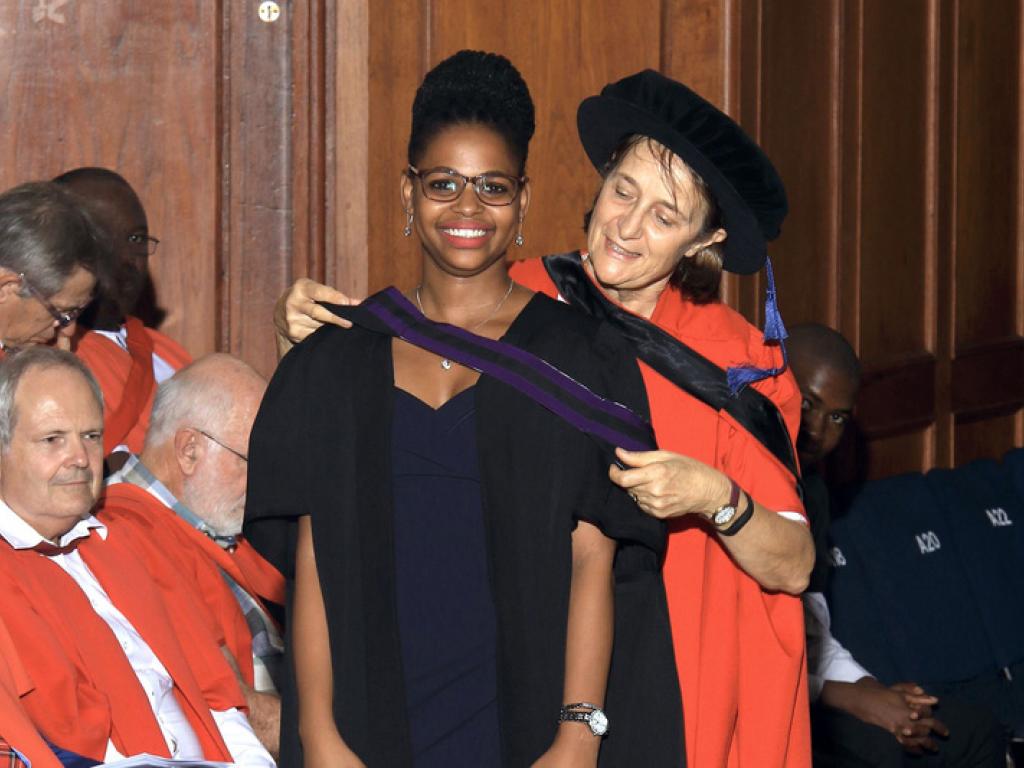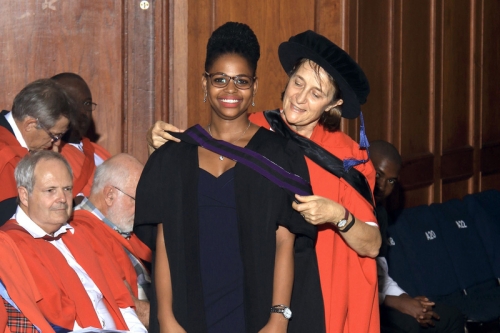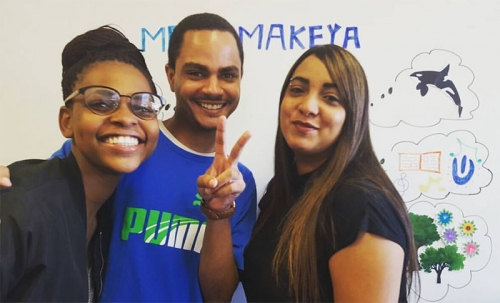Developing young climate-change professionals


Luleka Dlamini (24), a former intern at UCT’s African Climate and Development Initiative (ACDI), is hooded by Deputy Registrar Dr Karen van Heerden. Dlamini is currently pursuing a master’s degree in Environmental and Geographical Science.
“There is a lot of opportunity in the climate-related field if you put yourself out there. Embrace the challenge. You need to take the first step.”
That’s the advice from Luleka Dlamini, a former intern at the African Climate and Development Initiative (ACDI) at the University of Cape Town (UCT). In her current pursuit of a master’s degree in Environmental and Geographical Science, Dlamini is one of the top performers in her class, receiving academic awards and scholarship offers.
Hailing from a disadvantaged background, Dlamini grew up in Mandeni, a small KwaZulu-Natal town where life was full of challenges. On some days, she would stay home from school because she didn’t have bus fare. On other days, she worked as a fruit vendor to help support her family.
Despite a lack of resources at home and at school, however, Dlamini always excelled academically.
Without a laboratory at her school, or any chemicals for physics class, she said they “had to imagine the chemical reactions we read about in our textbooks”.
Access to proper career guidance was also non-existent, yet Dlamini resolved to keep learning and to ultimately pursue a career in science. She signed up for extra classes at a nearby school and investigated her options for tertiary education.
It is this determination to grow and succeed that eventually brought her to Cape Town in 2016, as an intern at the ACDI. Her internship was funded by the Department of Science and Technology (DST) and National Research Foundation (NRF) Internship Programme.
UCT’s ACDI is an interdisciplinary research hub that is focused on, among other things, developing a new generation of leaders to address complex climate-change challenges in various contexts. Many of its students go on to influence policy within government or to work as consultants, while others continue their academic pursuits.
“[The] ACDI is an interdisciplinary research hub that is focused on, among other things, developing a new generation of leaders to address complex climate change challenges in various contexts.”
Leigh Cobban, manager of ACDI’s education and capacity development portfolio, explained that the internship programme is designed to expose graduates to a wide range of experts, topics and tasks within the climate and development research field.
In its combination of mentorship and opportunities for peer collaboration, the programme supports and prepares interns for the next stage of their careers, she said.
Promoting professional development
Prior to being accepted into the ACDI programme, Dlamini earned a BSc in Environmental Sciences from the University of KwaZulu-Natal. Lacking the necessary funding to further her studies, however, she decided to give back to the community by teaching science at a high school in Vosloorus, Gauteng.
Sadly, during the course of her first year as a teacher, both her parents died, and she said it was an extremely challenging year for her on a personal level that saw her almost give up on her dream of further studies.
But then the opportunity at UCT came along.
“The internship gave [Dlamini] space to think about her next steps,” said Cobban.
Beyond the career development opportunities, the internship – and Cobban’s mentorship – provided her with the personal support that she needed at the time.
“We would have bi-weekly meetings to talk about personal things because Leigh knew what I was going through,” Dlamini said.
“And then we would talk about the development things – what skills do I want to improve and where do I want to be professionally and personally? We would plan my academic goals.”
The programme also provided her with practical experience in the field, which she said helped her develop valuable skills such as conducting interviews, engaging with different stakeholders, transcribing oral data and performing desktop research.
“We went to farms to interview people. I even had my own research project looking at agricultural extension officers and how they transfer information to farmers in the Western Cape.”
The programme also benefits the ACDI, with the interns proving invaluable to the initiative over the years.
“Being at a graduate level, they can pick up some work that our staff and academic lecturers don’t always have the time to do, like literature reviews on interesting topics,” Cobban said.
Several interns have also gone on to develop their careers further at the ACDI, making a longer-term contribution to the unit.
Creating climate change leaders
An important goal of the internship programme is to create a platform that exposes graduates to a multitude of topics, issues and opportunities in the climate change and development space, and then to support their further studies.
“We have a shortage of black South Africans studying at a postgraduate level in this field and it was great to have an influx of such students coming through from this internship,” Cobban said.
Dlamini, for example, is currently working towards a master’s degree that is focused on improving the performance of crop models through remote sensing data.
“I have found my niche. I’m even thinking about continuing with a PhD and I might do it overseas. There are lots of opportunities,” she said.
“We have a shortage of black South Africans studying at a postgraduate level in this field and it was great to have an influx of such students coming through from this internship.”
Fellow intern Andrew Hall is completing a research-based master’s degree under the ACDI’s director, Professor Mark New. Hall’s experiences as an ACDI intern are what provided him with the momentum to pursue a research career.

Former ACDI interns now making an impact in the climate change arena. They are (from left) Luleka Dlamini (24), Andrew Hall (26) and Makeya Karlie (25).
Makeya Karlie, another former intern, has continued her studies through the ACDI’s master’s programme. Karlie grew up in Mitchells Plain and graduated from the University of the Western Cape (UWC) with a BSc in Environmental and Water Science, and an honours degree.
She now works for the City of Cape Town in their Department of Enterprise and Investment, focusing on economic development and the green economy.
“At the ACDI, I was exposed to so many disciplines and ideas. I was introduced to the climate space and a whole other world opened up for me,” she said.
Cobban said she is extremely impressed with what the former ACDI interns have achieved.
“The internship programme gave them a platform to look at their options and career paths.”
Read more about the ACDI’s internship programme.
Story: Jorisna Bonthuys
Photos: Supplied
